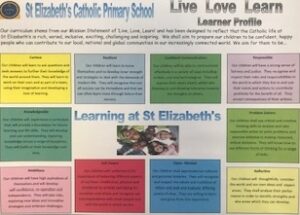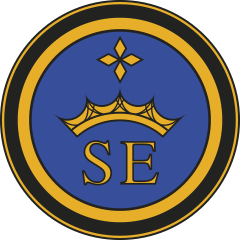Curriculum Overview
At St Elizabeth’s we are passionate about ensuring every child fulfils their potential and becomes an all-round exceptional citizen with the skills needed to succeed in life. We design our curriculum to ensure it is fully inclusive of every child and that it addresses each aspect of how a child develops, progresses and grows both academically and emotionally. We continuously monitor our curriculum to ensure we meet our statutory duties under The Equality Act 2010 and The Special Needs and Disability Regulations 2014 in making the curriculum accessible to all pupils.
Our Curriculum Intent
At St Elizabeth’s we aim to provide a Catholic education based on gospel values and the example of Christ. Underpinning our curriculum are our core values of ‘Live, Love and Learn’.
At St Elizabeth’s we are: skilled readers, confident writers, mathematicians, scientists, historians, geographers, musicians, artists, linguists, theologists, athletes, digitally fluent, designers and technologists, inclusive and diverse.
We want our children to have no limits to what their ambitions are and want them to embody our core values of ‘Live, Love and Learn’. Our curriculum is carefully constructed so that our children develop their academic, social and cultural capital.
Our curriculum promotes curiosity and a love and thirst for learning. It is ambitious and empowers our children to become independent and resilient. We strive for academic excellence and want our children to have high aspirations.
We encourage our children to celebrate success and build on disappointment in order to develop resilience. We want to equip them with not only the minimum statutory requirements of the National Curriculum but to prepare them for the opportunities, responsibilities, challenges and experiences of later life. We want our children to use the vibrancy of our great city to learn from other cultures, respect diversity, co-operate with one another and appreciate what they have. We achieve this by providing a strong SMSC curriculum, with British Values and our core values placed at the heart of everything we do. We enrich their time in our school with memorable, unforgettable experiences and provide opportunities which may otherwise be out of reach. We firmly believe that it is not just about what happens in the classroom, it is about the added value we offer to really inspire our children.
Our Curriculum Implementation
As a school, we place a great deal of importance on academic learning, and we take the progress and attainment of each child achieving the very best they are capable of very seriously. However, we also view each child as a complete person, and our curriculum has been tailored to ensure that each child grows as a person, and recognises their place in our community, our city and in our ever-changing world.
Our curriculum has been designed to reflect that life at St Elizabeth’s is rich, varied, caring, inclusive, exciting, challenging, inspiring, but, above all, rewarding.
Staff subject knowledge and confidence is vital to ensuring that children receive the best possible quality of education. As a school we have invested in bespoke continuous professional development for many years which has significantly improved our curriculum design and supported high standards across the curriculum.
Our approach to teaching across the whole curriculum puts children at the heart of their own learning, taking an active part in lessons and ensuring that the children are rich in language and cultural capital by the time they leave us to continue their educational journey. We recognise that children have a thirst for knowledge and we are committed to nurturing young: writers, performers, readers, speakers, mathematicians, scientists, historians, geographers, artists, designers, musicians, sports persons, computer users and so much more.
We aim to provide the building blocks of knowledge that enable the children to progress and follow their dreams through fostering the qualities of resilience and inquiry as well as planning opportunities for the children to know about keeping safe. In order to allow our children to fully develop these aptitudes, language is a key focus for us, both to develop the children’s communication abilities, and also to provide them with the rich and specific vocabulary from across the curriculum that underpins their knowledge and understanding of different subjects.
Our curriculum is built upon knowledge, and looks to develop the children’s skills and understanding as they progress through the school. Learning is further enhanced by a carefully planned range of educational experts, visits, PSHE and R.E. themed-weeks and a wide selection of extra-curricular activities, which allow the children to further develop their skills and understanding as they progress through the school.
We recognise the importance of helping our children develop fluency in all subject areas. This fluency is the basis upon which our children can be guided to master skills, develop their thinking and broaden and deepen their knowledge and understanding.
Alongside teaching of curriculum subjects and assessment of attainment and progress, we ensure that our children’s talents and successes are celebrated throughout school. High expectations of all our children leads to high aspirations and the belief that they can achieve in all they do.
With the understanding that a proportion of our children enter our school below age related expectations, we believe that family and community engagement is key to breaking down the barriers of any possible, pre-existing negative school experiences and to welcome families in to our happy, vibrant school.
The Early Years team focus on play-based learning, which is informed by topics and children’s interests and complemented with a balance of explicit adult directed tasks. This approach to teaching ensures high level engagement for all children throughout their Early Years’ education and creates positive learning experiences in readiness for Key Stage 1. Throughout all stages of learning, teachers use this holistic approach to mould and shape the curriculum in order for it to fit the needs of the children in their class.
Our Curriculum Impact
The impact and measure of implementation is to ensure children not only acquire the appropriate age related knowledge linked to the curriculum but also skills which equip them to progress from their starting points. In shaping our curriculum this way, progress can measured and evidenced for all children, regardless of their starting points or specific needs.
Teachers and staff work hard to plan a broad and balanced curriculum which is expertly delivered to ensure a child’s entire school experience enables them to develop a deep body of knowledge which will see them through to further study, employment and a successful adult life in whatever they choose.
When our children leave us, as well as being ready for a KS3 curriculum, they have a wealth of transferrable skills which have been developed throughout their time at primary school in an inclusive and nurturing environment. We are proud that once the children from St Elizabeth’s Primary School have left, they have been supported through their transition; have been exposed to rich vocabulary and have high aspirations and self-belief through the teaching of an interesting and engaging curriculum.
We shall assess the impact of our curriculum by high quality teacher assessment, effective intervention and support, the use of nationally standardised tests, professional reflection and external support and consultation with pupils and parents.
We use both formative and summative assessment information every day, in every lesson. Staff use this information to inform their short-term planning and short-term interventions. This helps us provide the best possible support for all of our pupils, including the more able. Subject leaders have mapped out the assessment opportunities for each phase and further broken these objectives down for each year group in each subject area.
Our staff use formative assessment grids to systematically assess what the children know as the topic progresses and inform their future planning. These formative assessment grids then inform summative assessment judgements for each topic in every foundation subject area (and science).
Assessment information is analysed by Subject Leads, the Assessment Lead and Headteacher as part of our monitoring cycle. Pupil progress reviews are conducted termly (summative). This process provides the SLT and Governors with an accurate and comprehensive understanding of the quality of education in our school.
We set out our monitoring cycle at the beginning of each academic year. This identifies when monitoring for all year groups is undertaken in all subject areas. Monitoring includes: book scrutinies, lesson observations and/or learning walks, pupil/parent and/or staff voice.
All of this information is gathered and reviewed. It is used to inform further curriculum developments and provision is adapted accordingly.
St. Elizabeth’s Learner Profile

